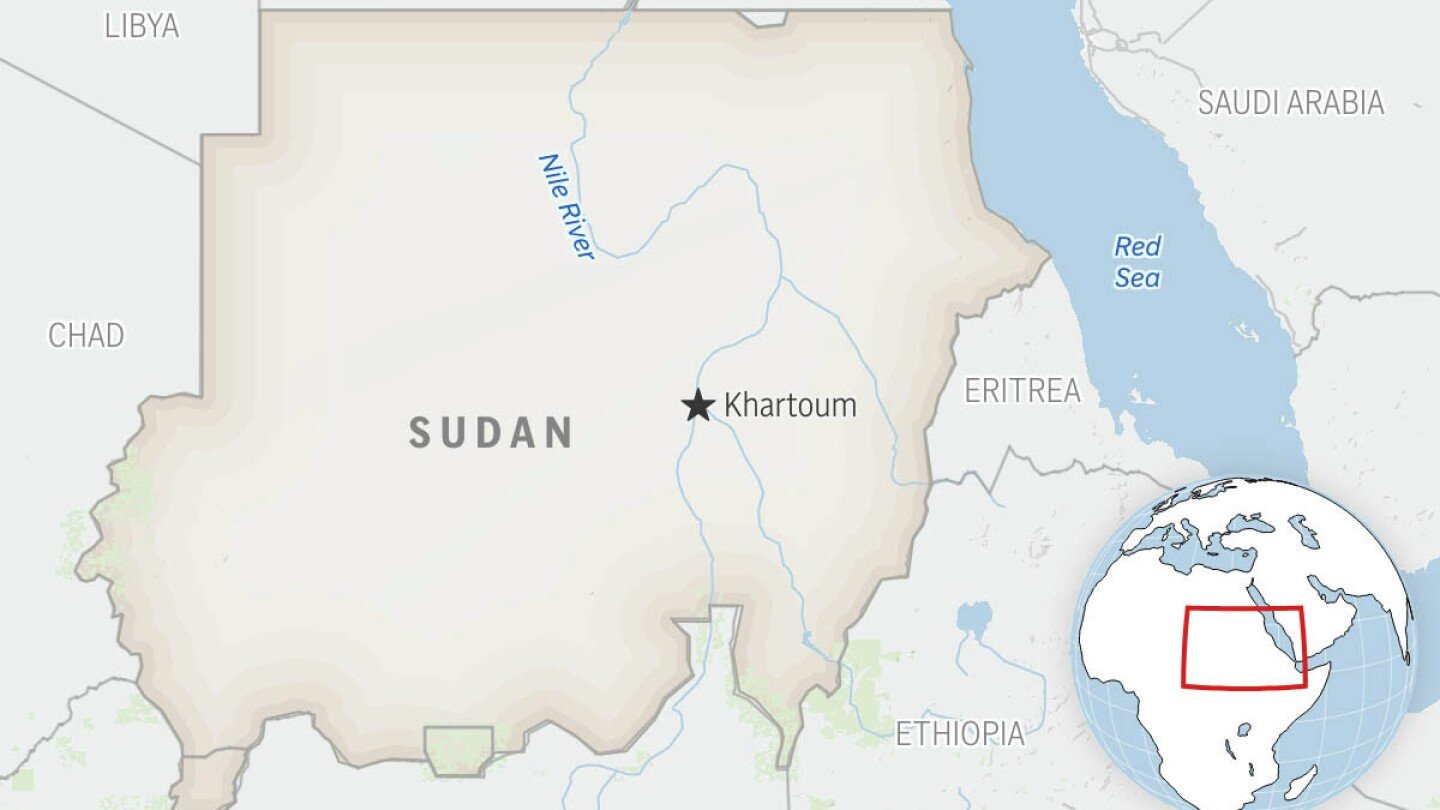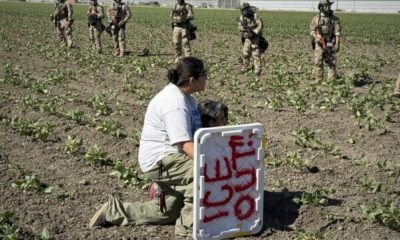Top Stories
Landslide in Sudan kills more than 1,000

CAIRO (AP) — A landslide wiped out a village in Sudan ’s western region of Darfur, killing an estimated 1,000 people in one of the deadliest natural disasters in the African country’s recent history, a rebel group controlling the area said late Monday.
The tragedy happened Sunday in the village of Tarasin in Central Darfur’s Marrah Mountains after days of heavy rainfall, the Sudan Liberation Movement-Army said in a statement.
“Initial information indicates the death of all village residents, estimated to be more than one thousand people. Only one person survived,” the statement read.
The village was “completely leveled to the ground,” the group said, appealing to the U.N. and international aid groups for help to recover the bodies.
The ruling Sovereign Council in Khartoum mourned “the death of hundreds of innocent residents” in the Marrah Mountains’ landslide. In a statement, it said “all possible capabilities” have been mobilized to support the area.
Footage shared by the Marrah Mountains news outlet showed a flattened area between mountain ranges with a group of people searching the area.
The tragedy came as a devastating civil war has engulfed Sudan after tensions between the country’s military and the paramilitary Rapid Support Forces exploded into open fighting in April 2023 in the capital, Khartoum, and elsewhere in the country.
Most of the conflict-stricken Darfur region has become mostly inaccessible for the U.N. and aid groups, given crippling restrictions and fighting between Sudan’s military and the RSF.
Aid group Doctors Without Borders has warned that multiple communities in Darfur, including the Marrah Mountains, have been cut off after more than two years of war and isolation, describing these areas as “a black hole” in Sudan’s humanitarian response.
It said in a July report that people in these communities have been “deprived from adequate assistance and snubbed by aid actors … despite enduring horrid conditions.”
The Sudan Liberation Movement-Army, centered in the Marrah Mountains area, is one of multiple rebel groups active in the Darfur and Kordofan regions. It hasn’t taken sides in the war.
The Marrah Mountains are a rugged volcanic chain extending for 160 kilometers (100 miles) southwest of el-Fasher, an epicenter of fighting between the military and the RSF. The area has turned into a hub for displaced families fleeing fighting in and around el-Fasher.
The conflict in Sudan has killed more than 40,000 people, forced more than 14 million to flee their homes and left some families eating grass in a desperate attempt to survive as famine swept parts of the country.
It has been marked by gross atrocities including ethnically motivated killing and rape, according to the United Nations and rights groups. The International Criminal Court said it was investigating alleged war crimes and crimes against humanity.
The village of Tarasin is located in the central Marrah Mountains, a volcanic area with a height of more than 3,000 meters (9,840 feet) at its summit. A world heritage site, the mountain chain is known for its lower temperature and higher rainfall than surrounding areas, according to UNICEF. It’s located more than 900 kilometers (560 miles) west of the capital city, Khartoum.
Sunday’s landslide was one of the deadliest natural disasters in Sudan’s recent history. Hundreds of people die every year in seasonal rains that run from July to October. Last year’s heavy rainfall caused the collapse of a dam in the eastern Red Sea Province, killing at least 30 people, according to the U.N.
Top Stories
Rising inequality is turning US into an autocratic state, billionaire warns | US economy

One of the world’s most prominent hedge fund billionaires has warned that rising inequality is turning the US into an autocratic state and condemned business leaders for failing to speak out against Donald Trump’s policies.
Ray Dalio, the founder of Bridgewater Associates, said “gaps in wealth” and a collapse in trust were driving “more extreme” policies in the US.
Speaking to the Financial Times, the veteran financier said many western countries were affected by growing inequality, leading voters to turn increasingly to autocratic leaders.
“I think that what is happening now politically and socially is analogous to what happened around the world in the 1930-40 period,” he said.
“Classically, increased wealth and value gaps lead to increased populism of the right and populism of the left and irreconcilable differences between them that can’t be resolved through the democratic process.
“So democracies weaken and more autocratic leadership increases as a large percentage of the population wants government leaders to get control of the system to make things work well for them.”
Concerns about a significant rise in borrowing by the US government were well founded, said Dalio, who has long predicted a reckoning for economies that allow debts to rise.
In his books, Principles for Dealing with the Changing World Order and How Countries Go Broke: the Big Cycle, he has described how large annual spending deficits and unsustainable debt growth had brought the US economy to the brink of a debt crisis – a situation that had worsened over many years.
“The great excesses that are now projected as a result of the new budget will likely cause a debt-induced heart attack in the relatively near future,” he said. “I’d say three years, give or take a year or two.”
He also expressed alarm at Trump’s interference in the decisions of the central bank and the buying of shares in corporations to further his “Made in America” programme.
after newsletter promotion
The US president wants the Federal Reserve to cut interest rates in an effort to boost economic growth and combat rising unemployment. But the Fed’s chair, Jay Powell, has warned the president’s import tariff increases could push up prices with the effect that investors will sell US financial assets rather than see them devalued.
Dalio said attacks on the Fed “would undermine the confidence in the Fed defending the value of money and make holding dollar-denominated debt assets less attractive which would weaken the monetary order as we know it”.
“I am just describing the cause and effect relationships that are driving what is happening,” he said. “And by the way, during such times most people are silent because they are afraid of retaliation if they criticise.”
Dalio, who is worth about $19bn (£14bn), started Bridgewater in 1975 and built the firm over decades to manage about $170bn of investor funds, according to the latest filings.
Top Stories
Stock market today: Dow, S&P 500, Nasdaq sink as Treasury yields jump amid tariff, Fed uncertainty – Yahoo Finance

- Stock market today: Dow, S&P 500, Nasdaq sink as Treasury yields jump amid tariff, Fed uncertainty Yahoo Finance
- Wall St hits over one-week low on tariff uncertainty, data in focus Reuters
- US stocks fall as bond sell-off spills into equities Financial Times
- Stock Market Today: Dow Futures Fall; Treasury Yields Rise — Live Updates The Wall Street Journal
- Dow falls 250 points to kick off September on tariff worries, rising bond yields: Live updates CNBC
Top Stories
Kraft Heinz undoes blockbuster merger after a decade of changing tastes

NEW YORK (AP) — Kraft Heinz is splitting into two companies a decade after a merger of the brands created one of the biggest food manufacturers on the planet.
One of the companies, currently called Global Taste Elevation Co., will include brands such as Heinz, Philadelphia cream cheese and Kraft Mac & Cheese, Kraft Heinz said Tuesday. The other, currently called North American Grocery Co., will include legacy brands like Maxwell House, Oscar Mayer, Kraft Singles and Lunchables. The official names of the two companies will be released later.
Kraft Heinz said in May that it was conducting a strategic review of the company, signaling a potential split. It expects the transaction to close in the second half of 2026.
When the company formed in 2015, it wanted to capitalize on its massive scale. But shifting tastes complicated those plans, with households seeking to introduce healthier options at the table.
Kraft Heinz and other food producers have tried to follow those trends. In 2021, Kraft Heinz sold both its Planters nut business and its natural cheese business, vowing to reinvest the money into higher-growth brands like P3 protein snacks and Lunchables. But the company continued to struggle, and Kraft Heinz’s net sales fell 3% in 2024.
“Kraft Heinz’s brands are iconic and beloved, but the complexity of our current structure makes it challenging to allocate capital effectively, prioritize initiatives and drive scale in our most promising areas,” Executive Chair Miguel Patricio said in a statement.
The path to the merger of Kraft and Heinz began in 2013, when billionaire investor Warren Buffett teamed up with Brazilian investment firm 3G Capital to buy H.J. Heinz Co. At the time, the $23 billion deal was the most expensive ever in the food industry.
3G was also behind the formation of Restaurant Brands International — a merger of Burger King, Tim Hortons and Popeyes — and Anheuser-Busch InBev. It’s known for strict cost controls and so-called zero-based budgeting, which requires all expenses to be justified each quarter.
The deal was intended to help Heinz, which was founded in 1869 in Pittsburgh, expand sales of its condiments and sauces on grocery store shelves. Heinz’s new owners also set about cutting costs, laying off hundreds of workers within months.
At the same time Kraft, based in Chicago, sought for a partner after a 2011 split from its snack division, which became Mondelez International.
In 2015, Buffett and 3G decided to merge Heinz with Kraft. The merger created the 5th largest food and beverage company in the world, with annual revenue of $28 billion. Buffett and 3G each contributed $5 billion for a special dividend for Kraft shareholders.
But the combined company struggled, despite layoffs of thousands of employees and other cost-cutting measures. Even at the time of the merger, many consumers were shifting away from the kinds of highly processed packaged foods that Kraft sells, like Velveeta cheese and Kool-Aid.
Kraft Heinz also had trouble distinguishing its products from cheaper store brands. At Walmart, a 14-ounce bottle of Heinz ketchup costs $2.98; the same size bottle of Walmart’s Great Value brand is 98 cents.
In 2019, Kraft Heinz slashed the value of its Oscar Meyer and Kraft brands by $15.4 billion, citing operational costs and supply chain problems. But many investors blamed the company’s leadership, saying its zeal for cost-cutting was hurting brand innovation.
The company’s net revenue has fallen every year since 2020, when it saw a pandemic-related bump in sales. In April, Kraft Heinz lowered its full-year sales and earnings guidance, citing weaker customer spending in the U.S. and the impact of President Donald Trump’s tariffs.
Buffett told CNBC Tuesday that he’s disappointed that Kraft Heinz decided to go forwarded with the split, which will likely cost the company $300 million and take a year to complete. And he’s frustrated that shareholders won’t get a vote on this move.
Buffett said Berkshire’s Greg Abel, who is scheduled to succeed Buffett as CEO next year and served on the Kraft Heinz board for years, told the company about a week ago that Berkshire opposed the move but Kraft Heinz went ahead with it anyway. Berkshire’s two board members resigned in the spring.
Berkshire has held onto its massive 27% Kraft Heinz stake, making it the company’s largest shareholder, even as stock price fell roughly 70% since the merger. Buffett has acknowledged in the past that Berkshire overpaid for the investment in the first place. Berkshire took a $3.76 billion write-down on the value of its stake in Kraft Heinz in the second quarter.
“It certainly didn’t turn out to be a brilliant idea to put them together, but I don’t think taking them apart will fix it,” Buffett said to CNBC. He didn’t immediately respond to questions from The Associated Press Tuesday.
Carlos Abrams-Rivera will continue to serve as CEO of Kraft Heinz and will become CEO of North American Grocery Co. once the separation is complete. Kraft Heinz said that its board is working with an executive search firm to identify potential CEO candidates for Global Taste Elevation Co.
Kraft Heinz has no plans to change its current headquarter locations in Chicago and Pittsburgh.
The announcement follows the recent breakups of other big food companies. Late last month, Keurig Dr Pepper said it would buy the owner of Peet’s Coffee and then split itself in two, with one company selling coffee and the other selling cold beverages like Snapple, Dr Pepper, 7UP and energy drinks. Keurig and Dr Pepper merged in 2018.
In 2023, Kellogg Co. also split into two companies. Mars bought one of the companies, dubbed Kellanova, which owned snack brands like Pringles. Italian confectioner Ferrero announced in July that it planned to buy WK Kellogg, the cereal company.
Kraft Heinz shares fell 3% Tuesday.
___
Durbin reported from Detroit. AP Business Writer Josh Funk contributed from Omaha.
-

 Business4 days ago
Business4 days agoThe Guardian view on Trump and the Fed: independence is no substitute for accountability | Editorial
-
Tools & Platforms3 weeks ago
Building Trust in Military AI Starts with Opening the Black Box – War on the Rocks
-

 Ethics & Policy1 month ago
Ethics & Policy1 month agoSDAIA Supports Saudi Arabia’s Leadership in Shaping Global AI Ethics, Policy, and Research – وكالة الأنباء السعودية
-

 Events & Conferences3 months ago
Events & Conferences3 months agoJourney to 1000 models: Scaling Instagram’s recommendation system
-

 Jobs & Careers2 months ago
Jobs & Careers2 months agoMumbai-based Perplexity Alternative Has 60k+ Users Without Funding
-

 Education2 months ago
Education2 months agoVEX Robotics launches AI-powered classroom robotics system
-

 Funding & Business2 months ago
Funding & Business2 months agoKayak and Expedia race to build AI travel agents that turn social posts into itineraries
-

 Podcasts & Talks2 months ago
Podcasts & Talks2 months agoHappy 4th of July! 🎆 Made with Veo 3 in Gemini
-

 Education2 months ago
Education2 months agoAERDF highlights the latest PreK-12 discoveries and inventions
-

 Education2 months ago
Education2 months agoMacron says UK and France have duty to tackle illegal migration ‘with humanity, solidarity and firmness’ – UK politics live | Politics





















